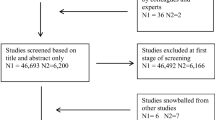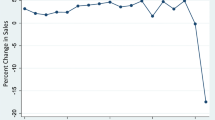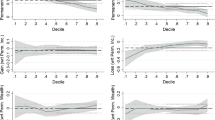Abstract
The accuracy of the measured income of family enterprises is a matter of importance in studies of, inter alia, human capital, income distribution, and consumption behavior. Enterprise surveys can measure this income through detailed questions. Household surveys offer a better perspective for a study of living standards and poverty: they capture more of the truly small-scale one-person enterprises; there is a wealth of relevant information about the household; and household surveys allow one to integrate family enterprises into household decisions about labor supply, risk sharing, enterprise start-up, and asset formation.
This paper examines three enterprise income values that one may derive from household surveys held in the Côte d'Ivoire and Ghana. The three values vary much and do not correlate all that well. This sobering conclusion implies that relying on self-reported values of sales revenue, expenditures and enterprise earnings is risky. Greater effort should be made to measure the transactions of enterprises carefully. Using worksheets and cross-checking responses in loco should help, but since many enterprises do not use any accounting system, it may be necessary to monitor inflows and outflows either personally or with diaries.
Similar content being viewed by others
References
Ainsworth, Martha and Juan Muñoz, 1986, The Côte d'Ivoire Living Standards Survey: Design and Implementation, LSMS Working Paper 26, Washington, D.C.: The World Bank.
Ainsworth, Martha and Jacques van der Gaag, 1988, Guidelines for Adapting the LSMS Living Standards Questionnaires to Local Conditions, LSMS Working Paper 34, Washington, D.C.: The World Bank.
Andersson, Tommy D., 1987, Profit in Small Firm: A Model Based on Case-Studies from the Informal Sector in a Developing Country, Aldershot, England: Avebury.
Becker, Eugene H., 1984, ‘Self-Employed Workers: An Update to 1983’, Monthly Labor Review 107(7), 14–18.
Cortes, M., A. Berry, and A. Ishaq, 1987, Success in Small and Medium-Scale Enterprises: The Evidence from Colombia, New York: Oxford University Press.
Fain, T. Scott, 1980, ‘Self-Employed Americans: Their Number Has Increased’, Monthly Labor Review 103(11), 3–8.
Gillis, Malcolm, 1984, ‘Episodes in Indonesian Economic Growth’, in Arnold C. Harberger (ed.), World Economic Growth: Case Studies of Developed and Developing Nations, San Francisco, ICS Press.
Greer, Olen L., 1989, ‘A Decision-Tree Approach to the Design and Implementation of Accounting and Information Systems for Small Business’, Journal of Small Business Management 27(1), 8–16.
Grootaert, Christiaan, 1986, Measuring and Analyzing Levels of Living in Developing Countries: An Annotated Questionnaire, LSMS Working Paper 24, Washington, D.C.: The World Bank.
Grootaert, Christiaan and Ana-Maria Arriagada, 1986, ‘The Peru Living Standards Survey: An Annotated Questionnaire’, mimeographed, Living Standards Measurement Study, Washington, D.C.: The World Bank.
Haber, Sheldon E., Enrique J. Lamas, and Jules H. Lichtenstein, 1987, ‘On Their Own: The Self-Employed and Others in Private Business’, Monthly Labor Review 110(5), 17–23.
Hart, Keith, 1973, ‘Informal Income Opportunities and the Structure of Urban Employment in Ghana’, Journal of Modern African Studies 11(1), 61–89.
Heller, P. S., A. L. Bovenberg, T. Catsambas, K. Y. Chu, and P. Shore, 1988, The Implications of Fund-Supported Adjustment Programs for Poverty: Experiences in Selected Countries, Occasional Paper 58, Washington, D.C.: International Monetary Fund.
Ho, S. P. S., 1980, Small-Scale Enterprises in Korea and Taiwan, World Bank Staff Working Paper 384, Washington, D.C.: The World Bank.
Holmes, Scott and Des Nicholls, 1988, ‘An analysis of the Use of Accounting Information by Australian Small Business’, Journal of Small Business Management 26(2), 57–68.
International Labour Organization, 1972, Employment, Incomes and Equality: A Strategy for Productive Employment in Kenya, Geneva: ILO.
International Monetary Fund, 1988, International Financial Statistics, Washington, D.C.: IMF.
Lavy, Victor and John L. Newman, 1989, ‘Wage Rigidity: Micro and Macro Evidence on Labor Market Adjustment in the Modern Sector’, The World Bank Economic Review 3(1), 97–117.
Little, Ian M., 1987, ‘Small Manufacturing Enterprises in Developing Countries’, The World Bank Economic Review 1(2), 203–237.
Little, Ian M., Dipak Mazumdar, and John M. Page, 1987, Small Manufacturing Enterprises: A Comparative Analysis of India and Other Economies, New York: Oxford University Press.
Loveman, Gary and Werner Sengenberger, 1991, ‘The Reemergence of Small-Scale Production: An International Comparison’, Small Business Economics 3(1), 1–37.
Moock, Peter, Philip Musgrove, and Morton Stelcner, 1990, Education and Earnings in Peru's Informal Nonfarm Family Enterprises, LSMS Working Paper 64, Washington, D.C.: The World Bank.
Page, John M., 1979, Small Enterprises in African Development, World Bank Staff Working Paper 363, Washington, D.C.: The World Bank.
Pernia, Ernesto M. and Joseph M. Pernia, 1986, ‘An Economic and Social Impact Analysis of Small Industry Promotion: A Philippine Experience’, World Development 14(5), 637–651.
Portes, Alejandro, Manuel Castell, and Lauren A. Benton, 1989, ‘Conclusion: The Policy Implications of Formality’, in Alejandro Portes, Manuel Castell, and Lauren A. Benton (eds.), The Informal Economy, Studies in Advanced and Less Developed Countries, Baltimore: The Johns Hopkins University Press.
Scott, Chris and Ben Amenuvegbe, 1989, Sample Designs for the Living Standards Surveys in Ghana and Mauretania, LSMS Working Paper 49, Washington, D.C.: The World Bank.
Steel, William F., 1977, Small-Scale Employment and Production in Developing Countries: Evidence from Ghana, New York: Praeger.
Steel, William F. and Leila M. Webster, 1990, Small Enterprises in Ghana: Responses to Adjustment, Industry Series Paper 33, Washington, D.C.: The World Bank.
Stelcner, Morton, Ana-Maria Arriagada, and Peter Moock, 1988, Wage Determinants and School Attainment among Men in Peru, LSMS Working Paper 38, Washington, D.C.: The World Bank.
Storey, David J. and S. Johnston, 1987, Job Generation and Labour Market Change, London: MacMillan Press.
Storey, David, Kevin Keasey, Robert Watson, and Pooran Wynarczyk, 1987, The Performance of Small Firms: Profits, Jobs and Failures, Beckenham, Kent, UK: Croom Helm Ltd.
Strassmann, W. P., 1987, ‘Home-Based Enterprises in Cities of Developing Countries’, Economic Development and Cultural Change 36(1), 120–144.
Vijverberg, Wim P. M., 1986, ‘Cost-Sharing and Net/Gross Revenue Reporting by Non-Agricultural Enterprises in the Côte d'Ivoire Living Standards Survey’, mimeographed, Living Standards Measurement Study, Washington, D.C.: The World Bank.
Vijverberg, Wim P. M., 1988, Non-Agricultural Enterprises in Côte d'Ivoire: a Descriptive Analysis, LSMS Working Paper 46, Washington, D.C.: The World Bank.
Vijverberg, Wim P. M., 1991, ‘Profits from Self-Employment: A Case Study of Côte d'Ivoire’, World Development 19(6), 683–696.
Wilcock, D. and E. Chuta, 1982, ‘Employment in Rural Industries in Eastern Upper Volta’, International Labor Review 121(4), 455–468.
World Bank, 1989, Sub-Saharan Africa: From Crisis to Sustainable Growth, Washington, D.C.: The World Bank.
Author information
Authors and Affiliations
Additional information
Without implicating anyone for any remaining errors, I appreciated the comments and assistance of Paul Glewwe, Valerie Kozel, Kalpana Mehra, and the referees of the Journal.
Rights and permissions
About this article
Cite this article
Vijverberg, W.P.M. Measuring income from family enterprises with household surveys. Small Business Economics 4, 287–305 (1992). https://doi.org/10.1007/BF00388624
Accepted:
Issue Date:
DOI: https://doi.org/10.1007/BF00388624




